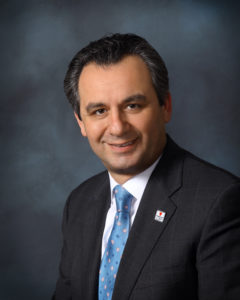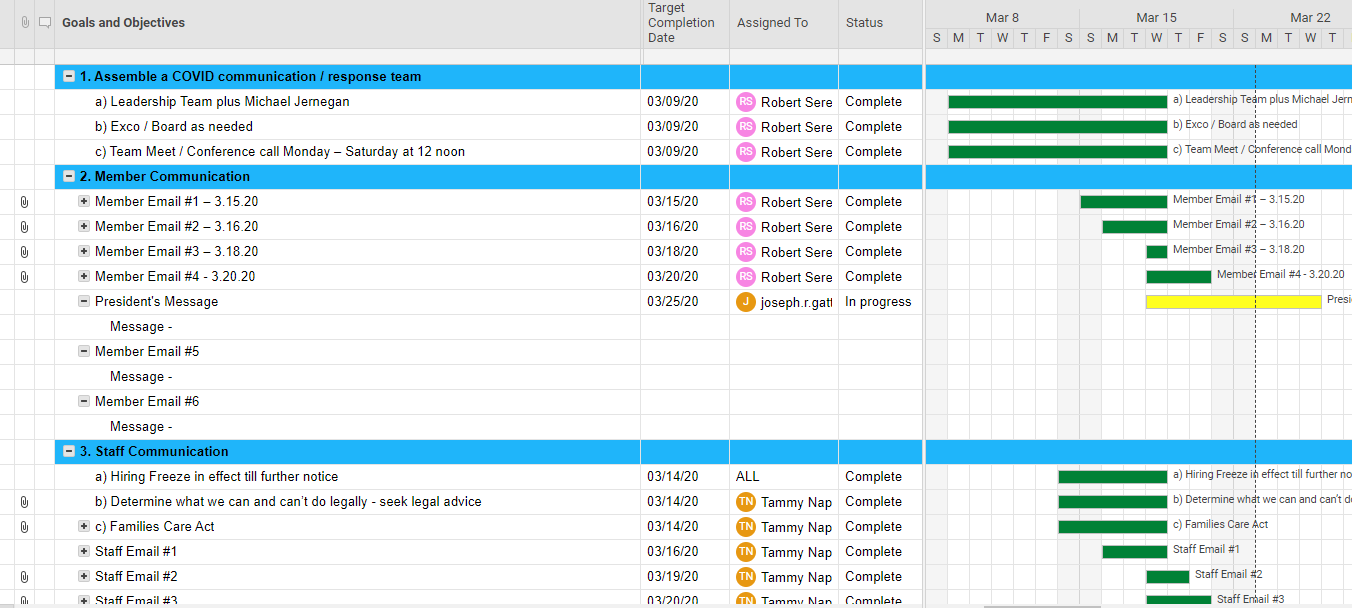This week GGA Partners continues its series of communications to help leaders of private clubs address challenges confronting their businesses and their employees with three perspectives from the front lines of club management.
Today: Robert Sereci, GM/COO, Medinah Country Club, Medinah, Illinois.
A Comprehensive Project Plan for Responding to Rapidly Changing Circumstances Focuses Efforts and Assigns Responsibility
 You can’t predict a crisis, but you can – and should – plan for one.
You can’t predict a crisis, but you can – and should – plan for one.
Having a plan for how to respond in times of crisis is essential to ensuring that all critical action elements are addressed. Equally important, a comprehensive plan helps your leadership team understand their individual responsibilities and the actions for which they will be held accountable. In addition, a timeline sets out clear deadlines and helps track progress toward your goals.
We developed a comprehensive COVID-19 project plan for our leadership group at Medinah and with the help of GGA Partners (with whom we recently collaborated on a strategic planning project), loaded the plan into the Smartsheet software tool to assign tasks, track project progress, manage calendars, and share documents. Below is the template we developed, which we’re happy to share with fellow club leaders.
To see a clean templated version that readers are free to use as a starting point, click here. Users can also download the corresponding Excel export that is editable and able to be imported directly to their instance of Smartsheet (click here to download).

From the planning template, we wrote a summary of the four key elements of the plan. In total, we viewed the actions under each section as a non-negotiable checklist for our leadership team.
Communication
- Assemble a COVID communication/response team – Should include members of the management team and the board.
- Member Communication – Focus on awareness, early measures and key dates, including club closure, locker and club storage pick up, etc.
- Staff Communication – Determine potential payroll taxes relief and other payroll aid tools available and seek legal advice. Identify the work-from-home capabilities and obstacles for team members.
- Board Communications – Brief the board and seek approval on immediate priority policy changes required.
- Committee Communication – Work with committee chairs to reschedule future meetings and determine conference call solutions.
- Other Stakeholder Communication – Plan for reaching out to vendors, prospective members, group reservations and other relevant stakeholders.
Operations
- Member Offerings/Venues – Separate into short-term versus long-term. Key checklist items include F&B menu/offering, vendor relationships, golf course opening plan and member access to pick up property.
- Cleaning Action Steps – Update the cleaning checklist with added preventative measures and assign personnel.
- Facilities – Define the future usage of each core facility at the Club (clubhouse, pro shop, F&B, admin offices) and any policy or function changes required.
- Other Operations – Define the operational plan for other areas of the business, including turf maintenance/engineering facilities, prospective member programs and non-member business- related income such as existing bookings for banquets and tournaments.
- Staff policy/scheduling and pay scenarios – short-term and long-term policy, and expected costs for salaries of full-time, part-time and seasonal employees (full shutdown vs. partial shutdown).
Financial Impact Planning
- Scenario Planning – Identify the most likely shutdown scenarios and model assumptions that have the greatest impact on the financial model (i.e. change in dues, wages, etc.).
- Preserving Cash Plan – Review all capital projects, loan schedules, outside revenue contracts to identify ways to conserve cash. Adjust assumptions for new member forecasts and resignation forecasts.
- Cost Cutting Plan – Based on the new assumptions for revenue and cash, determine the most prudent areas for cut-backs to payroll, operating expenses, contracts, events, etc.
- Revenue Generation Plan – Identify any new offerings the club can provide to support revenue generation, such as meal replacement, to-go orders, limited golf, event catering, etc.
Contingency Plans
- Determine a plan for shelter in place – Determine the trigger that would lead to no staff or members on property (i.e. order from city officials) and the time-sensitive steps to be taken in that event.
- Determine trigger and plan to close club completely – How does the plan change if shelter in place orders are extended or if a member or employee is diagnosed with the virus?
- Determine trigger and plan to reopen club completely – Leadership team develops a back-to- work protocol and a ramp-up plan.
- Club Events/Golf Tournament Status – Determine how each scenario above affects the status of scheduled club events that have not been postponed.
A note about Smartsheet: there are several different project planning tools out there, but I am quite fond of Smartsheet (www.smartsheet.com). I use the software extensively for project planning and highly recommend it. From a strategic planning perspective, it has been a great tool for us to keep track of progress on our strategic action plan and to keep our leadership group aligned on performance against our goals.
Because sometimes we just need to laugh …




